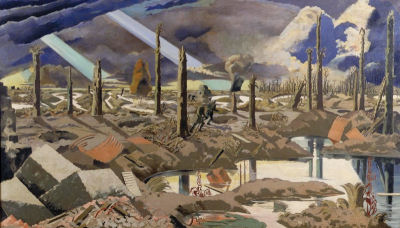
Battles involving England - First World War


|
Battles involving England - First World War |

|
Poems about the First World War
|
The First World War involved most of the world's great powers. It was also called the Great War, and (before the Second Word War) The World War, and the the War to End All Wars. On one side, there was United Kingdom and the British Empire, France, the Russian Empire, Belgium, Serbia, Italy, Japan, Greece, Romania and (later) the United States. On the other side was the German Empire, the Austro-Hungarian Empire, the Ottoman Empire and the Kingdom of Bulgaria. Before the First World War, there was a power balance between two "armed camps", where the countries within each group had agreed to support each other if attacked by any country in the other group. This was supposed to reduce the risk of war, as the consequences would be so dire. Archduke Franz Ferdinand of Austria was the heir to the Austro-Hungarian throne. He was assassinated in Sarajevo, Bosnia by a terrorist in 1914. Because of this, Austria invaded Serbia. The pre-war alliances were invoked, so within weeks the major powers were at war. They had colonies, so the conflict soon spread around the world. Battle of Somme 1916 (location)At the beginning of the war, the British troops confidently expected to be "home by Christmas" (Click here for a soldier's letter saying this). The German Army invaded France in August 1914 and occupied large areas of that country, but were then brought to a halt. Previous wars had involved battles and charges and sieges, but in this war the armaments had become so deadly that both sides had to dig trenches for their own protection, which led to a long stalemate, with little ground being won by either side. The Battle of Somme was an offensive by the British and French armies against the Germans. The Allied troops left their tranches to charge across No Man's Land to attack the German trenches protected by barbed wire. The machine guns and artillery caused horrific casualties and only a small amount of ground was gained. There were more than 1.5 million casualties. Click here for a brief description of the Battle of the Somme from the air. The British army was a volunteer army at this stage, but so many were killed that it was impossible to replenish them with volunteers and conscription was brought in. Life in the trenches, the horrors of the Battle of the Somme and other battles, and the effects of new weapons including poisonous gas were documented in war poetry and paintings. There was increasing use of machinery used in war. Aeroplanes were used for the first time (Click here for the diary of an early airman). Tanks were invented to break the stalemate of the trenches. Their name was originally a disguise. They were shipped as "water tank for Mesopotamia"! The Russians left the war in 1917 because of the Russian Revolution. The United States entered the war in 1917, partly on the grounds that Germany violated American neutrality by attacking international shipping. This meant that the Allies had ample supplies of men and materiel, and an over-whelming advantage. There was a ceasefire on the 'eleventh hour of the eleventh day of the eleventh month' 1918, which is still honoured on Remembrance Day in Britain each year with a two-minutes silence. The Treaty of Versailles treaty was signed in 1919. It made Germany pay reparations for the war, which impoverished Germany, caused much bad feeling and contributed to the Second World War. |
 Soldiers in a communication trench during the Battle of the Somme  The Menin Road by Paul Nash, 1919 |
Spanish Flu at the end of the war was spread both by the close confinement of troops and their return home. It is estimated that anywhere from 50 to 100 million people were killed worldwide which is from three to seven times the casualties of the First World War (15 million), making it the most deadly natural disaster in human history.
Taken from Laurence Binyon's "For the Fallen", which was first published in The Times in September 1914. It is now said at Memorial services, especially on Remembrance Sunday.
|
They shall grow not old, as we that are left grow old; Age shall not weary them, nor the years condemn. At the going down of the sun and in the morning We will remember them. |
Dulce et Decorum EstBy Wilfred Owen in 1917, published posthumously in 1920. "Dulce et decorum est pro patria mori" means ""How sweet and fitting it is to die for one's country".
Bent double, like old beggars under sacks,
Gas! Gas! Quick, boys! - An ecstasy of fumbling,
In all my dreams, before my helpless sight,
If in some smothering dreams you too could pace |
Theyby Siegfried Sassoon in 1917, published in The Old Huntsman and Other Poems.
The Bishop tells us: 'When the boys come back
'We're none of us the same!' the boys reply. Suicide in the Trenchesby Siegfried Sassoon, published in Counter-Attack and Other Poems, 1918. I knew a simple soldier boy.....
In winter trenches, cowed and glum,
You smug-faced crowds with kindling eye |
Wikipedia (external site) for further information - Battles index